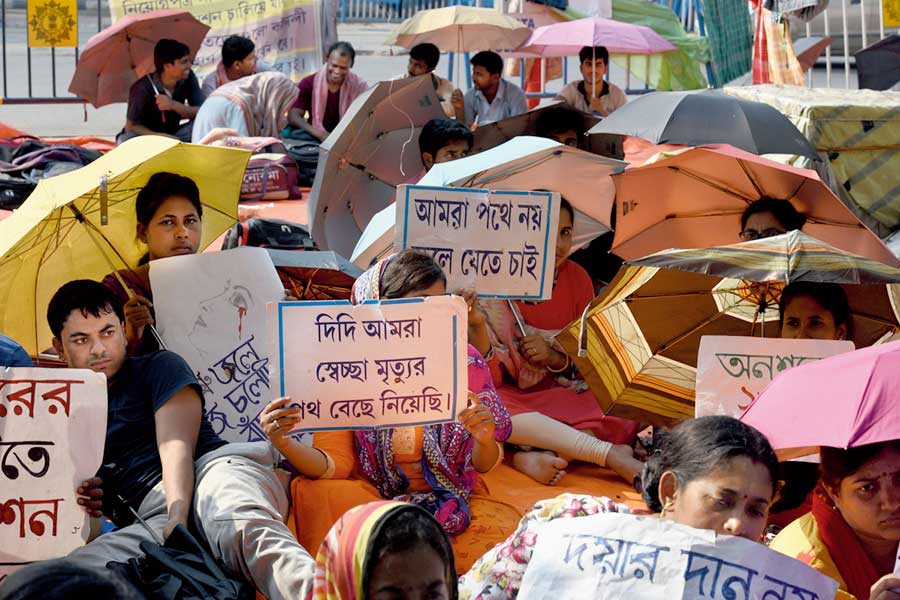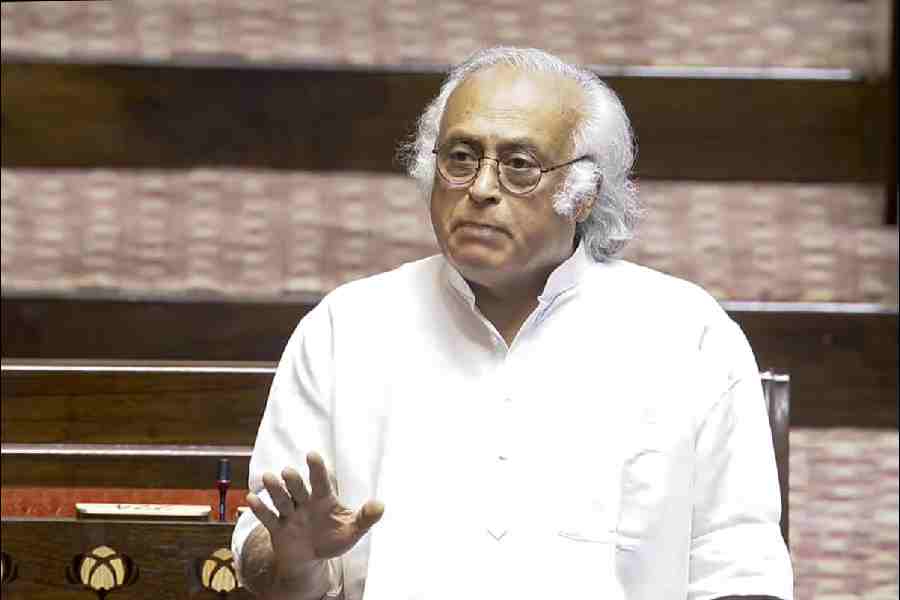Late in the afternoon of April 20, Tanima Biswas said goodbye to her students at Kakdwip Government Sponsored Ashram High School. She did not know that would be the last time she would see them.
The young woman who taught physics to boys and girls of classes IX and X is among the 25,753 teachers and non-teaching staff whose names were struck off the payrolls of the state education department following a Calcutta High Court order two days later (April 22) while ruling on a tainted government-supervised selection process.
If she had her way, 32-year old Tanima would have probably been working in the Indian Railways or the Border Security Force or the Central Reserved Police Force as she had cleared entry-level exams for all. Her gender and associated middle-class family hang-ups did not allow her. One of five brothers and two sisters, her family did not consider it worthy of a woman of “marriageable age” to don a uniform. The only option that remained was teaching.
Teaching has always been the most acceptable of professions for Bengalis, their traditional inability to fit into businesses or entrepreneurial ventures couched in the shroud of “respect” a school or college mentor inevitably attracts. Corporate jobs were also an option for the well-heeled, but over the years in industry-starved Bengal there is a drought of those. Given that most parts of Bengal have remained mofussil - barring a handful of district towns - jobs offered by the government in schools, colleges, hospitals, civic bodies and quasi-government bodies, are the only means for the youth of today to ensure social mobility and acceptability.
Hence, the frenzied rush - a hugely skewed demand vis-a-vis availability graph in a politically turbulent state leading to widespread corruption in acquiring government teachers’ jobs, a bribe-infused “system” that is by no means exclusive to Bengal, but has, over the years of political patronage, assumed the scale of a cottage industry.
While preparing for the West Bengal Civil Services, Tanima cleared the School Service Commission’s state-level selection test held in 2016, and in February 2019, became one of the 4,74,844 government school teachers in Bengal. On April 22, Tanima and two of her colleagues lost their jobs following an order of a division bench of the high court which basically annulled the all recruitments - held over three years - since it was unable to distinguish who among those appointed had got their jobs through unfair means: bribes, the alleged recipients of which include a minister, MLAs and officials who allegedly pocketed anything between Rs 5 lakh and Rs 15 lakhs to manipulate the merit list.
Irregularities in the appointments, exposed some time in 2016, led to a protracted legal battle with over 300 petitions filed over the years and probes by central agencies like the CBI and ED. The Mamata Banerjee government of Bengal challenged the latest high court verdict in the Supreme Court last week, arguing that the court “erroneously” set aside the entire selection process instead of segregating the valid candidates from those who had used unfair means to secure jobs.
The high court blamed obfuscation of the state government and its various recruitment agencies for the impasse. “In course of hearing all these matters, SSC, State and Board have perseveringly non-cooperated...
“Fraud perpetrated and perpetuated is deep and pervasive. Any attempt to shift the proverbial grain from the chaff would be an unprofitable exercise, prolonging the agony and putting a premium of dishonesty… we are left with the only option of cancelling all appointments...,” the judgment said.
In all, 25,753 appointments have been annulled. But the court verdict does not specify the break up, ie, how many of those who lost jobs were teachers and how many belonged to the non-teaching category. The number of schools that have been impacted is also not clear as yet.
Like Tanima, Samaresh Sadhukhan, a post-graduate in chemistry, was appointed as a physics teacher in a school in Murshidabad’s Lalgola. He joined on June 12, 2019. He began his tryst with teaching as a tutor in a free school while pursuing a bachelor's degree in chemistry. By the time he graduated, he had already begun to enjoy teaching. “After I got my degree, I applied and even appeared in interviews at two or three private companies. Nothing came of those,” said Sadhukhan. “By then I had taken a liking to teaching and decided to stick.”
Now, Sadhukhan and 14 others from the same school have lost their jobs. And all vouch for the fact that they made it on their own steam and did not indulge in irregularities. They are naturally shocked by the verdict that has robbed them of their livelihoods. But their hope lies in the numbers. “Something can definitely be done since there are so many of us legitimate recruits who lost jobs for no fault of ours.”
According to a 2022 report by Unified Digital Information of School Education, West Bengal provides employment to 4,74,844 teachers in government schools (2,84,586 males and 1,90,258 females). If the numbers in private institutions are taken into account, the total goes up to 5,81,687.
As an employment option, teaching has remained primary in Bengal. “If there was a reasonably well functioning job market in the state, then so many young educated people would not have been sitting on a dharna in the state capital for years at a stretch,” said Indraneel Dasgupta, an economics teacher at the Indian Statistical Institute, referring to the over 1,140-day protest by groups of aspirants who did not make it to the merit list and blame the bribery scam for their plight.
“They are forced to do so (hold a sit-n) because there is no other option for them. Good quality, stable and well-paying jobs in the private sector are available only in Calcutta and to some extent Siliguri, Durgapur and Asansol. Where will the young educated people elsewhere in the state go,” he asked.
“School mashtery”, as teaching is often referred to in Bangla, was always a socially respectable position, as depicted in legions of Bengali films and books, though not always a lucrative one. Yet, teachers do end up with happy endings.
In 2009, Tapas Biswas, a post-graduate in political science from Burdwan University, cracked the written test for the School Service Commission. Biswas wanted to be a cop but the English language was a handicap. On August 12, 2010, he got a job as a history teacher at Amrita Bharati Vidya Bhawan in East Midnapore’s Khejuri. “When I started as a teacher I was extremely unhappy. I wanted to be a policeman and here I was reading out from textbooks to students,” he said. Soon, however, things changed. “I came to love what I do.”
Two years ago, he got a transfer to Simulpur Anandapara Narahari Vidyapith, Thakurnagar, North 24-Parganas, closer to his home. Yes, he has one now, thanks to a home loan that his bank gave him willingly, courtesy his government job. “Today the local club asks me for donations to organise a puja, or a sports event, knowing that I can make a sizeable contribution. All this was possible because I am a teacher,” said Biswas, son of a farmer who barely had any formal education.
Biswas’s story mirrors how teaching has sustained Bengal’s youths for decades together. A job in a sarkari school is the only means available for gaining social mobility for millions like Biswas rooted in their mofussil upbringing.
“The decision is usually made at the higher secondary level itself,” said Dasgupta of ISI. “Earlier they would see advertisements issued for appointment of teachers and many candidates from those around them would get jobs. Thus, expectation levels grew.”
Sukumar Pain, the general secretary of the All Bengal Teachers’ Association, said he had no other career option but to take up teaching 35 years ago. “I studied geography (honours) from Chandernagore College. Ours was a huge family, six brothers and three sisters. Even if I wanted to there was nothing else that I could do,” said Pain amidst preparing for a legal battle to reinstate those like Tanima, Tapas and Sadhukan.
When Pain started teaching in 1989, there was no school service commission. His application went to the school management committee where he was called for an interview. After an interview his name was recommended to education department officials in the district. Finally, his appointment letter came through the school.
Bipul Bhattacharya, now in his 30th year as a teacher of English in a city school, recalls his name was recommended by the employment exchange to a school in the northern fringes. “For those of us who did not or could not be doctors and engineers, the career options that existed were in the government sector. Many of us were already giving tuition. Teaching became a respectable extension,” said Bhattacharya, who recalls he had the option of becoming either a clerk in a government office or a teacher. Clearly, the second option seemed to be the “best”.
Today, if Bipul Bhattacharya and Tanima were to face off in a debate, she is most likely to disagree with him.
A week since the high court division bench gave its verdict, Tanima is back at her home in North 24-Parganas’ Bagdah. Not just the future, her worry is the immediate present too. The loss of a job, the loss of face and the unspoken stigma by association.
“I will have to go through the whole process (of competitive examination) again if I have to remain a teacher. The competition has grown stronger. Moreover, I have little faith left in the system,” she said. Tanima worries about her students though. “I wonder who is going to teach them after the vacation.”











